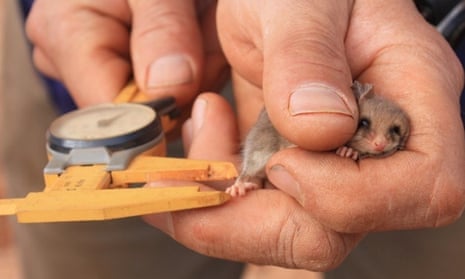A key program that has unearthed 700 new Australian plant and animal species has been extended until 2017 via a funding deal involving the government and the mining company BHP Billiton.
The Bush Blitz scheme, which was established in 2010, will run for a further three years, with $12m in funding from the federal government and BHP, with each party contributing $6m.
The program will run as a partnership between the government, BHP and the environment group Earthwatch Australia.
Bush Blitz sends Australian scientists to remote parts of the country to scour the bush, waterways and even underground for plants and animals not documented by science.
More than 700 species have been found and analysed since 2010. The government estimates there are more than 566,000 species in Australia but 75% of them have yet to be identified.
Australia’s vast size has contributed to a knowledge deficiency of its species, with 45% of continental Australia and 90% of its marine area yet to be properly surveyed by scientists.
Jo Harding, manager of the Bush Blitz program, told Guardian Australia she was “ecstatic” the initiative was remaining at a time when the government was cutting back spending in several areas.
“It shows that government and industry can work together to fund something that couldn’t be achieved otherwise,” she said.
Harding said Bush Blitz provided vital baseline data for conservation efforts. The scheme funded further scientific work to analyse species once they were discovered.
“If you don’t know what you have, you can’t protect it,” she said. “We’ve added thousands of records for properties so that the property managers can properly protect the areas that have these species.
“We aren’t talking about kangaroos and wallabies here; it’s the small things, the bugs and spiders. If they are endemic to an area, we can lose them without knowing they are there.
“They really provide the building blocks for life. They are the recyclers, such as flies, and the pollinators, such as bees and butterflies. They do a lot of the ecosystem services and we just don’t know what the implications would be if we lost them.”
Bush Blitz scientists work with agencies such as the CSIRO to map out areas likely to contain unknown species, with parts of central Australia a primary focus.
Discoveries include a delicate blue eye fish, which lives in the pools on top of waterfalls in the Northern Territory. Scientists also found a strange species of wolf spider that walks on water in the Kimberley and a new type of native truffle in Mildura, Victoria.
Euan Ritchie, an ecologist at Deakin University, who is not involved in Bush Blitz, told Guardian Australia: “Looking for new species is a vital endeavour in order to know what biodiversity we have, and most importantly, to then manage and conserve it appropriately.
“Mining companies funding environmental work is now commonplace and I have no concerns about this as long as the work and research findings remains free from external influence.”
Senator Simon Birmingham, parliamentary secretary for the environment, said: “To keep our habitats healthy we’ve got to know what species habitats contain and Bush Blitz is helping to fill in those crucial gaps in our knowledge.
“This new funding will send teams of researchers to ‘blitz’ dozens more remote areas throughout Australia, uncovering their hidden biodiversity and discovering hundreds of species that are completely new to science.”

Comments (…)
Sign in or create your Guardian account to join the discussion